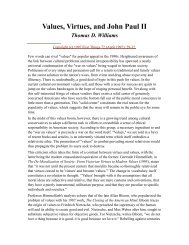Person-centred coaching psychology: A meta-theoretical perspective
Person-centred coaching psychology: A meta-theoretical perspective
Person-centred coaching psychology: A meta-theoretical perspective
You also want an ePaper? Increase the reach of your titles
YUMPU automatically turns print PDFs into web optimized ePapers that Google loves.
<strong>Person</strong>-<strong>centred</strong> <strong>coaching</strong> <strong>psychology</strong>by the medical model, would view understandingand enhancing optimal functioningand the alleviation of maladaptivefunctioning as a unitary task, as opposed totwo separate tasks as is the case when viewedthrough the lens of the medical model.The medical modelMaddux, Snyder and Lopez (2004) haveargued that the adoption of the medicalmodel in <strong>psychology</strong> can be traced back to theorigins of the discipline and the influence ofpsychoanalytic theory, and the fact that practitionertraining typically occurred in psychiatrichospitals and clinics, where clinicalpsychologists worked primarily as psychodiagnosticiansunder the direction of psychiatriststrained in medicine and psychoanalysis.This led clinical psychologists to adopt themethods and assumptions of their psychiatristcounterparts, who were themselves trainedspecifically in the medical model.There were three implication of this.First, psychologists began to think in termsof dichotomies between normal andabnormal behaviours, between clinical andnon-clinical problems, and between clinicalpopulations and non-clinical populations.Second, it locates human maladjustmentinside the person, rather than in theperson’s interactions with the environmentand their encounters with socioculturalvalues and social institutions. Third, itportrays people who seek help as victims ofintrapsychic and biological forces beyondtheir control, and thus leaves them as passiverecipients of an expert’s care. These threeimplications stand in contrast to the person<strong>centred</strong>model which views well-being ascontinuous, emphasises the role of the socialenvironment, and the self-determination ofthe person.Thus, the medical model refers to thepremise that there is discontinuity betweenpsychopathological functioning and optimalfunctioning so that understanding and alleviatingdistress and dysfunction is a separatetask from facilitating well-being and optimalfunctioning. Thus, a medical model<strong>coaching</strong> <strong>psychology</strong> would be a differentactivity requiring a different knowledge baseand different skills than required forworking with people who are distressed anddysfunctional.<strong>Person</strong>-<strong>centred</strong> versus the medicalmodelIt should be clear from the above, that theperson-<strong>centred</strong> model and the medicalmodel are mutually exclusive. The formerviews understanding and enhancing optimalfunctioning and the alleviation of maladaptivefunctioning as a unitary task. The latterviews understanding and enhancing optimalfunctioning as two separate tasks. Insofar as<strong>coaching</strong> psychologists have viewed the alleviationof distress and dysfunction and thefacilitation of well-being and optimal functioningas two separate tasks, therefore, theyhave implicitly adopted the medical model.It will be argued that <strong>coaching</strong> <strong>psychology</strong>should take a stance of opposition to themedical model.The alternative is the person-<strong>centred</strong>model. Terms like <strong>coaching</strong>, counselling,and psychotherapy are interchangeable inperson-<strong>centred</strong> practice because they allrefer to the practice of respecting the selfdeterminationof others. Thus it would bepossible to talk of any arena of professional<strong>psychology</strong> as person-<strong>centred</strong>, if it adoptedthe <strong>meta</strong>-<strong>theoretical</strong> <strong>perspective</strong> that humanbeings have an inherent tendency towardgrowth, development, and optimal functioning.We could equally well talk of person<strong>centred</strong>counselling <strong>psychology</strong> orperson-<strong>centred</strong> clinical <strong>psychology</strong>. However,these arenas of professional <strong>psychology</strong> havenot adopted the person-<strong>centred</strong> model, butrather the medical model. If clinical andcounselling <strong>psychology</strong> had adopted theperson-<strong>centred</strong> <strong>meta</strong>-theory as opposed tothe medical model, there would now be noneed for <strong>coaching</strong> <strong>psychology</strong>, because clinicaland counselling <strong>psychology</strong> wouldalready be concerned with the full spectrumof human functioning!International Coaching Psychology Review ● Vol. 1 No. 1 April 2006 49



